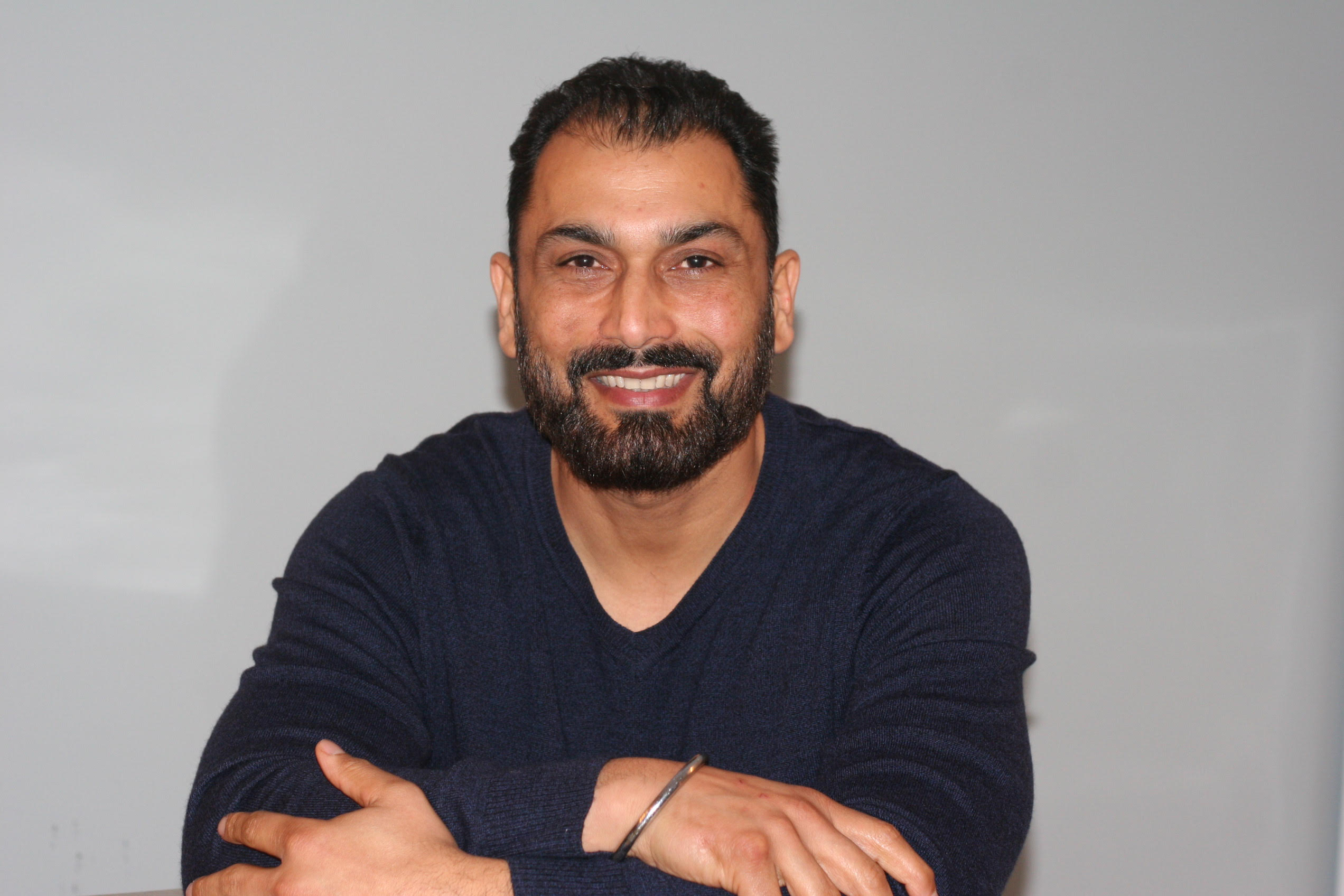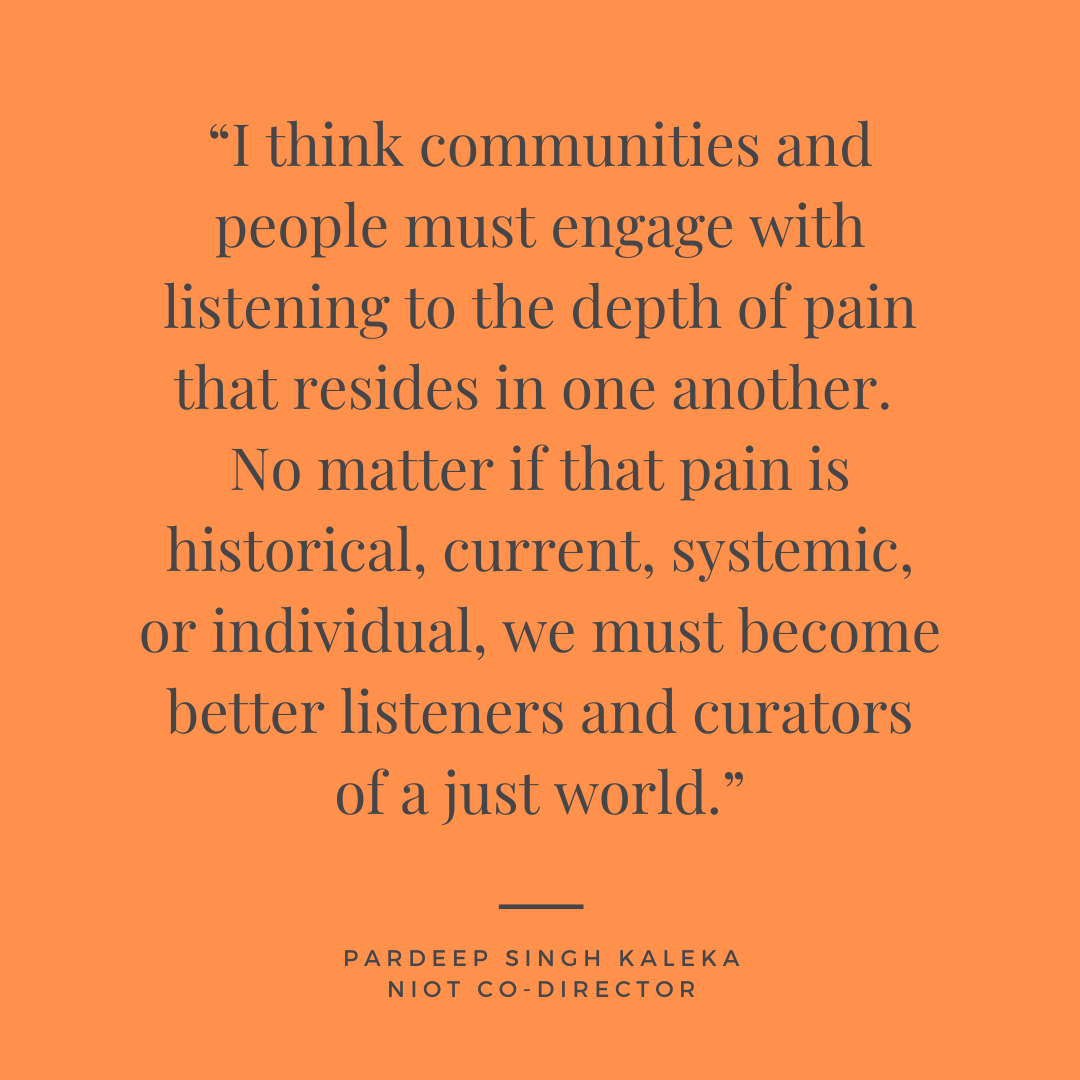Pardeep Kaleka is the New Co-Director of Not In Our Town
 |
We are grateful and elated to welcome Pardeep Kaleka as a new leader in this movement to stop hate and build inclusion in our communities. I could not imagine a better partner in this work than Pardeep. His experience, wisdom and commitment will help guide this community driven movement at a crucial time. I know his words and actions will inspire millions to stand up and speak out.
- Patrice O’Neill, Founder and Co-Director Not In Our Town
Pardeep Singh Kaleka first became acquainted with Not In Our Town when the film team began production on Waking in Oak Creek, a story of the community response to the attack at the Sikh Temple of Wisconsin. Pardeep’s father was one of seven people killed by a white supremacist that day. He and other Sikh leaders joined forces with community members in Oak Creek to begin a process of healing and understanding. In 2014, Pardeep joined NIOT’s Patrice O’Neill touring the country to screen the film with community stakeholders. In 2020, he became co-leader of the NIOT virtual conversation series.
It was clear that NIOT was pulling together all of the issues he had been working on in his life and in September, Pardeep joined our team as Co-Director of Not In Our Town.
As a first-generation immigrant from India, Pardeep has spent more than 25 years working in the fields of law enforcement, education and social services, as well as assisting hate crime survivors across the United States with recovery. He has also engaged in numerous crisis response coalition-building efforts across ethnic, racial and religious differences. With a specialization in understanding the impacts of communal trauma, he has developed policies and practices to help mental health workers, social service practitioners, law enforcement agents, and educators build healthier, safer, more inclusive communities.
Shortly after the death of his father at the Sikh Temple in Oak Creek, WI, he cofounded Serve2Unite, an organization nationally recognized for bridging school and community groups on violence prevention. As part of his quest to understand the causes of hate, Pardeep teamed up with Arno Michaelis, a former white supremacist and one of the original founders of Life After Hate. Pardeep and Arno are co-authors of “The Gifts of Our Wounds,” about finding forgiveness after hate. He is also an award-winning columnist with Milwaukee Independent on addressing community health concerns from an ecological frame.
Pardeep serves as a de-radicalization intervention specialist with Parents4Peace, working to off-ramp at-risk youth and men entangled in violent ideologies. For two years, Pardeep was Executive Director of the Interfaith Conference of Milwaukee. He sits on numerous local and national boards dedicated to mental health access, equity concerns, community strengthening and resilience, violence deterrence and hate prevention.
Pardeep knows that genuine healing must happen both internally and externally and that we all must empower one another to communicate, connect, and create a world that is less hateful and divided.
NIOT Blog Editor Theresa Riley got together with Pardeep recently to ask him about his life’s work and offer all of you a chance to get to know our new Co-Director!
Pardeep: I genuinely believe in the work that NIOT has done in the past and continues to do building relationships and combating hate from a whole-of-society and whole-of-community approach. Personally, myself and the entire Sikh community are forever grateful for the way in which NIOT was able to tell our story post August 5, 2012, in the aftermath of hate and the way in which the voice of the community harmed was centered in the healing. As co-director, I want to continue in the work to raise awareness and help communities become more resilient against hate in all of its forms. Obviously, we are living through some very challenging times and the narrative of rejection seems to be overtaking the American landscape. I believe that our collective mission at NIOT, which is to “stop hate, and build safe, inclusive communities,” is vitally important work.
You recently spoke at the White House as part of its United We Stand Summit to address the rise of hate-fueled violence in the United States. What was that experience like for you personally, and will you be involved in future efforts by the US government to prevent hate-fueled violence and the harm it causes in communities?
 |
It was truly an honor to speak at the White House and meet the President. It is very heartening that there is such an emphasis by the administration to address hate, especially home grown targeted violence. We have known for some time now that there are very pressing concerns of targeted violence directed towards religious and ethnic minorities and the LGBTQI communities at large, however for the administration to commit resources towards progress underscores America’s commitment to the belongingness of our communities. It has felt that for the past 10 years and really since 9/11, the focus of multicultural belongingness has taken a back seat to fortifying our country against foreign threats. So this felt like a shift in many respects to recomiting our country to the promise of providing refuge to the hurt, broken, and displaced instead of safety and security measures influenced by fear.
What do you think are the most important actions communities can take to build inclusive, safe communities for everyone?
 |
I think communities and people must engage with listening to the depth of pain that resides in one another. No matter if that pain is historical, current, systemic, or individual, we must become better listeners and curators of a just world.
Tell us a little bit about yourself. You live in Wisconsin. What do you do in your free time? Do you have any free time?
I am the father of 4 beautiful children, married for 19 years. My mother is widowed and I do my best to keep her spirits up. Over the years, I have been a police officer in the inner city of Milwaukee and then became an educator for 12 years in that same neighborhood. I have not seen anything stronger than the indestructible will of a child. However, on the flip side, I have also not seen anything as fragile as the will of a child. I have been blessed to work with NIOT for the past 10 years, and my simple hope is that I can do something to leave this world in a better place than how I found it. I have carried many titles, but my absolute favorite is, “dad.”
What are your goals for NIOT in the short and long term? NIOT has been active for 25 years this year. What do you think we should be focused on in the next 25?
NIOT has been an amazing organization for a very long time and has inspired so many communities groups and organizations to dig into the messy work of racism and hate. My short term goal is to engage partners all across the US to join us in this needed work. My long term goal is to make anti-hate work less needed. I’m super excited to work with you, Theresa, and to work with Patrice, and the entire team at NIOT. I am also excited to work with the Board and the stakeholders at NIOT. We truly do this work together, and I’m excited to wage peace with NIOT.
Add new comment